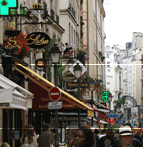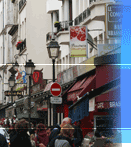Rue Montorgueil Restaurants: Complete Dining Guide 2025
🍽️ Quick Dining Overview
Best Times: Lunch 12-2 PM, Dinner 7:30-10 PM | Reservations: Essential for dinner | Budget: €15-150+ per person | Cuisine Styles: Traditional French, Modern bistro, International
Rue Montorgueil stands as one of Paris's greatest culinary streets, where eight centuries of gastronomic tradition meet contemporary dining innovation. This historic market street, stretching from Les Halles to the Grands Boulevards, houses establishments that have fed Parisians since the Middle Ages alongside modern restaurants that represent today's evolving food scene.
Unlike touristy areas where restaurants cater primarily to visitors, Rue Montorgueil maintains its authentic character as a neighborhood dining destination. Local residents frequent the same establishments as international visitors, creating the genuine Parisian dining atmosphere that sophisticated travelers seek. From historic patisseries that have operated for centuries to innovative bistros redefining French cuisine, every establishment tells a story of culinary evolution.
🏛️ Historic Dining Institutions
The culinary heritage of Rue Montorgueil reaches back through centuries, with several establishments claiming founding dates that predate the French Revolution. These historic venues offer more than exceptional food—they provide direct connections to France's gastronomic past.
L'Escargot Montorgueil (Since 1832)
Address: 38 Rue Montorgueil, 75002 Paris
Phone: +33 1 42 36 83 51
Hours: Daily 12:00 PM - 10:30 PM
Average Price: €45-65 per person
Specialty: Traditional escargots, Belle Époque atmosphere
L'Escargot Montorgueil represents the pinnacle of traditional French dining on the street. The restaurant's Belle Époque interior—with its original murals, vintage zinc bar, and period lighting—transports diners to the golden age of Parisian gastronomy. Their signature escargots, prepared with traditional garlic-parsley butter, are considered among the finest in Paris.
The dining experience here emphasizes ceremony and tradition. Servers, dressed in traditional bistro attire, present each dish with the pride that reflects centuries of culinary expertise. The wine list favors classic French regions, with particular strength in Burgundian selections that complement the snail-focused menu.
💡 Dining Insider Tip
Request a table in the main dining room to fully appreciate the historic murals and original décor. Lunch service offers the same quality at lower prices, with a €32 fixed menu that includes their famous escargots.
Au Rocher de Cancale (Since 1804)
Address: 78 Rue Montorgueil, 75002 Paris
Phone: +33 1 42 33 50 29
Hours: Tuesday-Saturday 12:00 PM - 2:00 PM, 7:30 PM - 10:30 PM
Average Price: €38-55 per person
Specialty: Oysters, traditional French cuisine
Au Rocher de Cancale built its reputation on serving the finest oysters and seafood that arrived daily at the adjacent Les Halles market. The restaurant's name honors Cancale, the Breton port famous for producing France's most prized oysters. While the original market has disappeared, the restaurant maintains its commitment to exceptional seafood.
The interior preserves 19th-century dining room atmosphere with dark wood paneling, vintage mirrors, and traditional table settings. The seasonal menu reflects classic French cooking, with particular emphasis on dishes that showcase the restaurant's historic relationship with the sea.
🥐 Legendary Food Shops and Patisseries
Rue Montorgueil's food shops represent living museums of French culinary craft. These establishments, many with centuries of operation, continue traditions that define French gastronomy while adapting to contemporary tastes and dietary needs.
Stohrer (Since 1730)
Address: 51 Rue Montorgueil, 75002 Paris
Phone: +33 1 42 33 38 20
Hours: Monday-Friday 7:30 AM - 8:30 PM, Saturday-Sunday 8:30 AM - 8:30 PM
Specialties: Rum baba, puits d'amour, seasonal pastries
Price Range: €3-25 per item
Stohrer claims the distinction of being Paris's oldest patisserie, founded by Nicolas Stohrer, pastry chef to King Louis XV. The shop's opulent interior—featuring painted ceilings, gilt mirrors, and antique display cases—creates an atmosphere of ancien régime luxury that enhances every purchase.
The rum baba, invented by Stohrer himself, remains the signature creation. This delicate yeast cake, soaked in rum syrup, represents the height of French pastry craft. The shop also excels in seasonal specialties, from Christmas yule logs to Easter chocolate creations, each prepared according to recipes refined over nearly three centuries.
⚠️ Peak Times Alert
Weekend afternoons and holiday periods see long queues at Stohrer. Visit weekday mornings for the best selection and shortest wait times. Their pastries sell out quickly, especially the daily-made rum babas.
À la Mère de Famille (Since 1761)
Address: 35 Rue du Faubourg Montmartre, 75009 Paris (nearby)
Phone: +33 1 47 70 83 69
Hours: Monday-Saturday 9:30 AM - 8:00 PM, Sunday 10:00 AM - 7:00 PM
Specialties: Artisanal chocolates, regional French confections
Price Range: €8-50 per selection
À la Mère de Famille represents France's oldest chocolate house, with original wooden fittings and hand-painted signs creating a museum-like shopping experience. The carefully curated selection includes chocolates from across France, each representing regional specialties and traditional production methods.
The knowledgeable staff provides detailed guidance on chocolate selection, explaining the terroir concepts that apply to cacao just as they do to wine. Gift packaging maintains traditional standards, with hand-tied ribbons and elegant boxes that honor the shop's three-century heritage.
🍷 Modern Bistros and Wine Bars
Contemporary dining establishments on Rue Montorgueil honor the street's culinary heritage while embracing modern techniques, international influences, and evolving dining preferences. These venues attract both neighborhood regulars and culinary adventurers seeking innovative experiences.
Le Comptoir Général
Address: Multiple locations near Rue Montorgueil
Style: Modern bistro with traditional French foundation
Hours: Daily 8:00 AM - 2:00 AM
Average Price: €25-40 per person
Atmosphere: Casual, neighborhood-focused
Modern bistros along and near Rue Montorgueil represent the evolution of Parisian dining. These establishments maintain classical French cooking techniques while incorporating seasonal ingredients, international spices, and contemporary presentation styles that appeal to diverse palates.
The emphasis on natural wines, locally sourced ingredients, and smaller portions reflects changing dining preferences while respecting the fundamental pleasure principles that define French cuisine. These venues create relaxed atmospheres where culinary exploration feels approachable rather than intimidating.
Wine Bar Culture
The covered passages intersecting Rue Montorgueil house intimate wine bars that specialize in French regional selections and small-plate dining. These venues perfect the aperitif culture that defines Parisian evening life, offering expert wine guidance in settings that encourage lingering conversation.
Natural wine movements and biodynamic viticulture find particular expression in these smaller venues, where passionate proprietors share their knowledge through carefully chosen selections that complement simple but expertly prepared foods.
📸 Food Photography Tips
Interior Lighting: Historic restaurants like L'Escargot and Stohrer offer beautiful ambient lighting for food photography. Ask permission before photographing in restaurants, and avoid flash which disrupts other diners' experiences.
🥖 Daily Bread and Market Shopping
The daily rhythm of Rue Montorgueil revolves around fresh bread, produce, and specialty foods that local residents purchase for their daily meals. Participating in this ritual provides authentic insights into Parisian food culture.
Boulangerie Eric Kayser
Address: Multiple locations
Hours: Daily 7:00 AM - 8:00 PM
Specialties: Traditional baguettes, seasonal breads
Quality: Competition-winning baker
Eric Kayser's boulangeries represent modern excellence in traditional bread-making. The daily baguette production follows time-honored techniques while incorporating innovations that enhance flavor and texture. Different bread varieties reflect seasonal ingredients and regional French traditions.
Fresh Produce and Specialty Foods
Fruit and vegetable vendors along Rue Montorgueil source products from Rungis, the massive wholesale market that replaced Les Halles. The selection reflects seasonal availability and includes both common varieties and specialty items that showcase French agricultural diversity.
Cheese shops, charcuteries, and fishmongers maintain the tradition of expert curation and customer education. Shopping at these establishments provides opportunities to learn about French food culture while assembling ingredients for picnics or apartment cooking.
☕ Coffee Culture and Casual Dining
Coffee culture on Rue Montorgueil encompasses both traditional café experiences and contemporary specialty coffee shops that reflect evolving beverage preferences while maintaining the social functions that define Parisian café life.
Traditional Café Experiences
Classic Parisian cafés along the street maintain the unhurried atmosphere where locals read newspapers, conduct business meetings, and observe street life over extended coffee sessions. These venues serve traditional French café fare—croissants, simple sandwiches, basic wines—in settings that prioritize social function over culinary innovation.
Specialty Coffee Movement
Newer coffee shops introduce third-wave coffee culture while respecting Parisian café traditions. These venues focus on single-origin beans, alternative brewing methods, and minimalist aesthetics that attract younger Parisians and international visitors seeking familiar coffee experiences.
🎭 Cultural Context
Dining Etiquette: French dining maintains formal courtesies—greet servers upon arrival, avoid rushing through meals, and appreciate the ritualistic aspects of food service that reflect centuries of cultural refinement.
🍴 Seasonal Dining and Special Events
Seasonal changes transform Rue Montorgueil's dining landscape as restaurants adapt menus to ingredient availability and weather conditions. Understanding these rhythms enhances both culinary experiences and cultural immersion.
Spring and Summer Dining
Warmer weather brings outdoor seating, lighter menus, and extended evening dining hours. Restaurants emphasize fresh vegetables, seafood, and regional wines that complement the season's abundance. Café terraces become essential elements of street life.
Autumn and Winter Specialties
Colder months showcase traditional French comfort foods—rich stews, game meats, and preserved ingredients that demonstrate classical cooking techniques. Wine selections shift toward fuller-bodied options that complement heartier fare.
Holiday periods bring special menus and traditional celebrations that provide opportunities to experience French cultural traditions through food. Christmas markets, New Year's celebrations, and seasonal festivals add festive energy to the street's culinary offerings.
🎯 Dining Strategies and Practical Advice
Reservation Recommendations: Book dinner tables 2-3 days in advance for popular restaurants, especially L'Escargot Montorgueil and Au Rocher de Cancale. Lunch reservations are less essential but recommended for weekend dining.
Budget Planning:
- Budget meals: €15-25 per person (cafés, simple bistros)
- Mid-range dining: €30-50 per person (quality bistros, wine bars)
- Fine dining: €60-100+ per person (historic restaurants, tasting menus)
Timing Considerations: French lunch service typically runs 12:00-2:00 PM sharp, with many restaurants closing between lunch and dinner. Evening service begins around 7:30 PM and continues until 10:30 PM or later.
🔗 Connecting Food and Culture
Dining on Rue Montorgueil provides more than exceptional meals—it offers direct participation in French cultural traditions that span centuries. From the morning ritual of selecting daily bread to evening aperitifs that extend social connections, food experiences here connect visitors to the rhythms and values that define Parisian life.
The street's culinary diversity, from ancient patisseries to innovative bistros, reflects France's ability to honor tradition while embracing change. Each meal becomes an opportunity to understand how French culture expresses itself through food, hospitality, and the social rituals that make dining a central element of civilized life.
Whether seeking traditional French cuisine, innovative contemporary dishes, or simple pleasures like exceptional bread and cheese, Rue Montorgueil offers culinary experiences that satisfy both appetite and curiosity. This is French food culture at its most authentic—unpretentious, neighborhood-focused, and deeply rooted in the daily pleasure of eating well.









